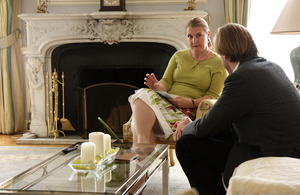"On Iran's nuclear programme, we are willing to look at any possibility that would take us forward. There's still plenty of time for negotiations."
Ambassador Susan le Jeune d’Allegeershecque speaks to the Wiener Zeitung about her work as UK Permanent Representative to the United Nations

Ambassador Susan le Jeune d'Allegeershecque speaking to the Wiener Zeitung
In a recent interview with the Wiener Zeitung newspaper, Ambassador Susan le Jeune d’Allegeershecque, who is also the UK Permanent Representative to the United Nations in Vienna, talks about her work with the International Atomic Energy Agency (IAEA), and the challenges it brings.
Wiener Zeitung: You have previous experience with the Foreign Office in the Non-Proliferation Department. How do your experiences in the nuclear sphere, now and then, compare?
Ambassador: The IAEA has a very clear mandate and it has managed to maintain its existence as a technical organisation with a really high level of technical expertise. It’s well-run, it’s well-managed and it does some absolutely vital work in non-proliferation and in other fields, such as in the peaceful uses of nuclear energy. I think what’s interesting is that between 1985 and today, the IAEA has been fundamentally very successful because the issues we were dealing with in 1985 are essentially the same ones we are dealing with today, which shows things haven’t got any worse. In the 1960s there were catastrophic predictions about how many nuclear weapon states there would be by the end of the twentieth century and it hasn’t happened. It’s also a very consensual organisation and the politics are not as intense as they are in other parts of the UN, which is a very positive thing.
Wiener Zeitung: One big aspect of the UK’s work with the IAEA involves resolving the issue of Iran’s nuclear programme. What are you asking Iran to do?
Ambassador: We’re not asking Iran to give up their nuclear programme. What we’re asking them to do is open their sites for inspection so that they can reassure us all that they don’t have any military aspirations with the programme. They have a right as every country to a peaceful nuclear programme, and we’re willing to help them in that but, in order for that to happen, they need to submit, as does every other country which is a signatory to the Non-Proliferation Treaty, to the programme of IAEA inspections and safeguards. At the moment, that’s not happening.
We have to find a way in order to advance what’s going on at the moment and it’s quite clear that, since last November, there’s not been any progress on the part of Iran. The IAEA have been working hard and we’ve been working hard with our partners in the E3+3 (UK, US, China, France, Germany and Russia) and there hasn’t been any progress. We would be, together with our partners, willing to look at any possibility that would take us forward, rather than the current situation.
The consequences for the Iranian people are now beginning to be felt because their currency has again dropped significantly, probably as a result of the increased sanctions that came into place on the 1st of July with the oil embargo. It’s beginning to have an impact on ordinary Iranians. We hope that this will bring the Iranian government to negotiate and make progress on the key issue which is their nuclear programme. Nobody is talking about getting rid of the Iranian government and changing the regime, that’s not what we want. We just want to be reassured on this particular aspect of what they’re doing. We need to continue with the negotiations on the dual track - the IAEA track and the E3+3 process. There’s still plenty of time for negotiations.